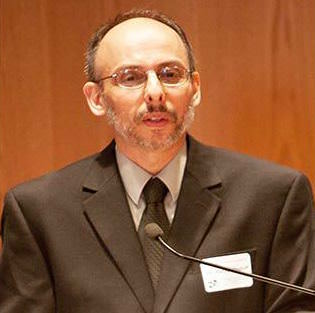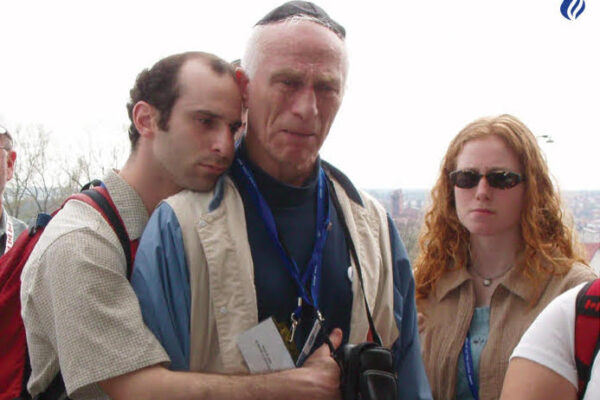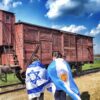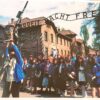 Interview with Dr. Rafael Medoff, the founding director of The David S. Wyman Institute for Holocaust Studies and author of 16 books about Jewish history and the Holocaust. His latest is “The Anguish of a Jewish Leader: Stephen S. Wise and the Holocaust” (available on Kindle from Amazon.com or as a free downloadable PDF fromwww.WymanInstitute.org).
Interview with Dr. Rafael Medoff, the founding director of The David S. Wyman Institute for Holocaust Studies and author of 16 books about Jewish history and the Holocaust. His latest is “The Anguish of a Jewish Leader: Stephen S. Wise and the Holocaust” (available on Kindle from Amazon.com or as a free downloadable PDF fromwww.WymanInstitute.org).
The Jewish Press: Why did you write The Anguish of a Jewish Leader?
Medoff: Stephen Wise’s supporters tend to defend everything he did, while some of his detractors condemn him as almost treasonous. I thought it would be useful to take a more nuanced look at the historical circumstances and probe deeper into the reasons for Wise’s relationship with President Roosevelt and Wise’s attacks on Jewish activists.
Jews today, by and large, think of Stephen Wise as a timid leader. You write in the book, though, that in his younger years Wise was something of a militant.
Correct. Wise was a Zionist at a time when most of his fellow Reform rabbis were anti-Zionists and he created the American Jewish Congress in 1918 as an activist alternative to the conservative and cautious American Jewish Committee.
Sometimes, however, Jewish leaders start out as firebrands and then gradually get tired, or even co-opted. Sometimes – and this is true of some leaders today as well – they start to really enjoy the “kavod” of having their photo taken with prime ministers and become reluctant to risk losing that by speaking out on controversial issues.
There were a number of proposals to save Jews during the Holocaust, including two that would have brought several hundred thousand Jews to Alaska and the Virgin Islands. Why did Wise oppose these plans?
I interviewed the leader of a group of rabbinical students who met with Wise in 1942. He told me they asked Wise about these two proposals and Wise told them the Virgin Islands were “too hot” for Jewish refugees and Alaska was “too cold.” That was ridiculous. Jews whose lives were in danger would gladly have gone anywhere, regardless of the weather, and Wise knew that.
The real reason he opposed these proposals was that he was unwilling to challenge President Roosevelt, and Roosevelt’s position was that letting Jews enter even those remote American territories would give them a springboard to try to get into the mainland United States.
Wise also opposed the famous Rabbis’ March on Washington in October 1943. Why?
Wise had two problems with it. The first was that the march highlighted the Roosevelt administration’s abandonment of the Jews, and that was something Wise wanted to downplay. The other issue was that Wise was personally uncomfortable at the thought of these very Jewish-looking Jews marching through the streets of Washington. That’s why he wrote an article denouncing the march as a “parade” and a “stunt.” He found it both politically and personally embarrassing.
Many Jews today regard Peter Bergson as a hero for his unconventional campaign in America to rescue European Jewry. You write, though, that Wise greatly disliked Bergson. Why would he dislike someone trying to save Jews?
Some historians claim that Wise opposed Bergson because Bergson had been connected with the Revisionist Zionist leader, Ze’ev Jabotinsky, and the Irgun. But I concluded from my research that two other factors were much more significant. One was sheer jealousy – Bergson’s group was making headlines and Wise didn’t like sharing the spotlight. The second was Wise’s fear that the Bergson Group’s loud protests would cause anti-Semitism.
Wasn’t this fear valid considering the unprecedented level of anti-Semitism in America during this time period?
Yes, his fear was valid – but only until the evidence showed that there was no reasonable basis for it. Jewish leaders worried that a march on Washington might cause an anti-Semitic backlash, but once the march took place and there was no backlash, it was unreasonable for Wise and his colleagues to continue opposing such marches.
At one point, Jewish leaders warned Bergson that a particular newspaper ad he was planning was so strongly worded that it might cause pogroms. Well, the ad was published in The New York Times and it didn’t cause any pogroms. So, at that point, Wise and other Jewish leaders should have acknowledged that their fears had been unwarranted.
You also write that Rabbi Wise believed that, as Americans, it might not be right to ask a government at war to take a special interest in the Jews of Europe. Isn’t there some validity to this argument as well?
Sure – except that during the Holocaust there were many things President Roosevelt could have done to help the Jews that wouldn’t have involved taking special action or detracting from the war effort. For example, the immigration quotas were largely unfilled; he could have simply let them be filled. Or troop-supply ships that were returning empty from Europe could have carried Jewish refugees.
Likewise, on the question of bombing Auschwitz, American planes were already flying within a few miles of the gas chambers in 1944 when they were bombing German oil factories nearby. It would have required a very minimal effort to drop a few bombs on the gas chambers or at least on the railway tracks leading to them.
At the end of The Anguish of a Jewish Leader, you quote several of Wise’s colleagues who said he was essentially a good man taken in by FDR’s enormous charm. Can you elaborate?
It’s true that President Roosevelt was remarkably skilled at gland-handing – telling people what they wanted to hear and making them feel as if he agreed with them even if he had no intention of doing what they wanted. There is an anecdote about FDR calling Wise “Stevie,” which may or may not be true, but there is no doubt Roosevelt understood how to disarm Wise by stroking his ego.
It’s also true that Wise’s admiration of Roosevelt was extreme. I found correspondence in which Wise referred to the president as “the All Highest” and similar expressions. The combination of FDR’s smooth talking and Wise’s weakness for flattery definitely made it harder for Wise to muster the courage to criticize the president’s policies.
But that’s exactly why he should have recused himself – if he didn’t have the political or personal courage to challenge Roosevelt’s abandonment of the Jews, he should have resigned.
What will your next book be about?
It’s called Cartoonists Against the Holocaust and it brings together political cartoons about the plight of the Jews in Europe which appeared in American newspapers in the 1930s and 1940s. The reader follows the history of the Holocaust through the eyes of political cartoonists, including Dr. Seuss and the famous “Herblock” (Herbert Block) of the Washington Post.
By Elliot Resnick
Original article published HERE.








